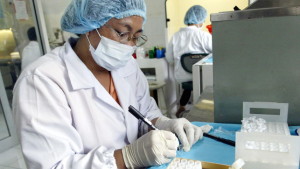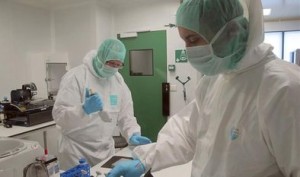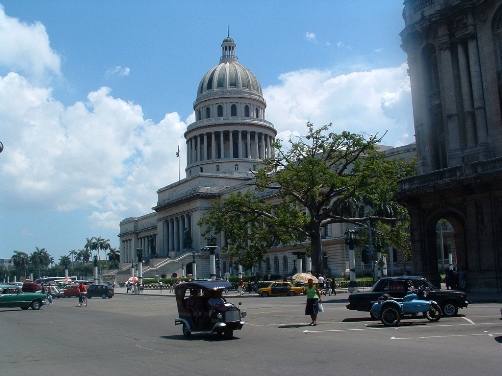SCIENTIFIC DIALOGUE BETWEEN THE UNITED STATES AND CUBA.
Cuban scientists have difficulty accessing the Internet or laboratory equipment, but are among the top professionals in Latin America.
The international scientific community is following with particular attention the new stage of dialogue between Cuba and the US, a process that can help normalize relations between Cubans and scientists around the world, and contribute to greater visibility of the science developed on the island.
Cuba has had relationships with scientific institutions around the world since the nineteenth century. However, since 1960 these links have been maintained under the shadow of the international embargo imposed by the US and both Cuban and US researchers have encountered various constraints by their respective governments when trying to establish partnerships.
Last year, in an open letter published in the journal Science, the American Association for the Advancement of Science (AAAS, for its acronym in English), one of the most important scientific organizations in the world, he asked the government of Barack Obama facilitate the granting of permits to travel to the island.
Currently, public sector researchers are not allowed to travel to Cuba, while the private sector can only do so by an authorization from the Treasury Department. In recent months there has been some relaxation in granting permits and have been several scientific delegations have been able to travel to the island and close partnerships with Cuban institutions.
These include the agreement reached with the Roswell Park Cancer Institute, a center of research on major US cancer. The agreement will allow the center to analyze a therapeutic vaccine against lung cancer, the CimaVax, which was developed at the Center of Molecular Immunology in Havana.
Cuban investigators
From Cuba they have also taken steps to facilitate relations between scientists of both countries, such as relaxation of control measures on researchers who are working outside the island. One of the big problems that Cuba has faced over recent decades has been to prevent the brain drain of the island. According to Victor De la Torre, Cuban researcher resident in Spain, the Cuban government has done everything possible to retain scientific talent, but considered to have erred in the way to go. “Instead of encouraging researchers to we left and we follow her form, the choice of the Cuban government was to ban and limit travel.”
However, “the situation has changed greatly in recent years and are now many Cubans are researchers throughout Europe,” says de la Torre, general coordinator of the National Institute of Bionformática, belonging to the National Cancer Research Centre.
Few publications in scientific journals
In addition to the complications caused by the blockade, as access to equipment and laboratory equipment or the difficulties of internet connection, the other leg on which the relative isolation of the Cuban scientists is based is in the field of scientific publications. The results provided by the database Web of Science, one of the largest in the world, leave no doubt about the situation on the island. Cuba does not reach the 3,000 articles published in 2014, far from the more than 10,000 published in Colombia, more than 30,000 of the 114,000 of Mexico or Spain.
This data does not match the scientific potential of the country, one of the most scientifically leading countries in Latin America, and have much to do with the particular scientific policy of the island. With a practical approach, Cuban scientific projects are primarily aimed at improving the living conditions of the population and the development of technologies of strategic importance for the country. According to Pastrana, most of the scientific results have been “collateral” to investigations that have social or productive interests and that is why “there are more patents and products in proportion to the papers published in journals of high impact.”
It is precisely this strategic value of Cuban science which in the opinion of Victor de la Torre causes a lack of openness. “Science in Cuba has a very important strategic value that has made has kept a tight lid on it and sometimes has avoided publishing certain results.” However, de la Torre recalled that many of the highest impact journals are based in the US and “this has not made it easier for Cuban researchers to publish them as well as researchers from other countries.”
Skepticism among the Cuban scientific community.
But despite the bold steps that both governments have to reach agreements, the situation is still far from resolved. Pastrana recalled that the decision to remove the blockage does not depend on Obama but the US Congress, the two cameras are currently dominated by the, always reluctant to initiate processes of dialogue with the Cuban government Republican Party. Pastrana thinks you should take this “short window of attention” to solve a problem whose solution “has over 50 years too late.” However, it fears that conservatives ignore “the value of the normalization process” and ending “making it a topic for discussion at the next election.”
This climate of skepticism is also present in the Cuban community outside the island. Tower for the approach is “extremely positive”, but fears that it may “come to nothing” given the conservative majority in Congress. In any case Pastrana is also optimistic and confident in the ability of the scientists to “see beyond the animosity of some politicians and to find ways to move forward constructively towards a relationship that may be beneficial for everyone.”
ElDiario, Spain / Teguayco Pinto / InternetPhotos / www.thecubanhistory.com
The Cuban History, Hollywood.
Arnoldo Varona, Editor.
DIÁLOGO CIENTÍFICO ENTRE ESTADOS UNIDOS Y CUBA.
Los científicos cubanos tienen dificultades para acceder a internet o a material de laboratorio, pero están entre los mejores profesionales de América Latina.
La comunidad científica internacional sigue con especial atención el nuevo escenario de diálogo entre Cuba y EEUU, un proceso que puede ayudar a normalizar las relaciones entre los científicos cubanos y los del resto del mundo, y que contribuirá a una mayor visibilidad de la ciencia que se desarrolla en la isla.
Cuba ha tenido relaciones con instituciones científicas de diversas partes del mundo desde el siglo XIX. Sin embargo, desde 1960 estos vínculos se han mantenido bajo la sombra del embargo internacional impuesto por EEUU y tanto los investigadores cubanos como los estadounidenses se han encontrado con diversas limitaciones por parte de sus respectivos gobiernos cuando intentaban establecer relaciones de colaboración.
El pasado año, en una carta abierta publicada en la revista Science, la Asociación Estadounidense para el Avance de la Ciencia (AAAS, por sus siglas en inglés), una de las organizaciones científicas más importantes del mundo, pidió al gobierno de Barack Obama que facilitara la concesión de los permisos para viajar a la isla.
En la actualidad, los investigadores del sector público no tienen permitido viajar a Cuba, mientras que los del sector privado solo pueden hacerlo mediante una autorización del Departamento del Tesoro. En los últimos meses se ha observado cierta relajación en la concesión de permisos y han sido varias las delegaciones científicas que han podido viajar a la isla y cerrar acuerdos de colaboración con instituciones cubanas.
Entre ellos cabe destacar el acuerdo alcanzado con el Roswell Park Cancer Institute, uno de los centros de investigaciones sobre el cáncer más importantes de EEUU. El acuerdo permitirá a este centro analizar una vacuna terapéutica contra el cáncer de pulmón, la CimaVax, que ha sido desarrollada en el Centro de Inmunología Molecular de La Habana.
Investigadores cubanos
Desde Cuba también se han dado pasos para facilitar las relaciones entre los científicos de ambos países, como la relajación de las medidas de control sobre los investigadores que se encuentran trabajando fuera de la isla. Uno de los grandes problemas a los que se ha enfrentado Cuba a lo largo de las últimas décadas ha sido el de evitar la fuga de talento de la isla. Según Víctor De la Torre, investigador cubano residente en España, el gobierno cubano ha hecho todo lo posible por retener el talento científico, pero considera que ha errado en la forma de conseguirlo. “En lugar de motivar a los investigadores para que saliéramos y nos siguiéramos formando, la opción del gobierno cubano fue prohibir y limitar los viajes”.
Sin embargo, “la situación ha cambiado mucho en los últimos años y ahora somos muchos los investigadores cubanos que estamos por toda Europa”, asegura de la Torre, coordinador general del Instituto Nacional de Bionformática, perteneciente al Centro Nacional de Investigaciones Oncológicas.
Escasas publicaciones en revistas científicas
Además de las complicaciones generadas por el bloqueo, como el acceso a maquinaria y material de laboratorio o las dificultades de conexión a internet, la otra pata sobre la que se sustenta el relativo aislamiento de los científicos cubanos está en el campo de las publicaciones científicas. Los resultados que ofrece la base de datos Web of Science, una de las mayores del mundo, no dejan lugar a dudas sobre la situación de la isla. Cuba no alcanza los 3.000 artículos publicados en 2014, lejos de los más de 10.000 publicados en Colombia, los más de 30.000 de México o los 114.000 de España.
Esto datos no concuerdan con el potencial científico del país, uno de los países científicamente más punteros de América Latina, y tienen mucho que ver con la particular política científica de la isla. Con un enfoque eminentemente práctico, los proyectos científicos cubanos están orientados fundamentalmente a la mejora de las condiciones de vida de la población o al desarrollo de tecnologías de carácter estratégico para el país. Según Pastrana, la mayor parte de los resultados científicos han sido “colaterales” a investigaciones que tienen intereses sociales o productivos y es por eso “que hay más patentes y productos en proporción a los trabajos publicados en revistas de alto impacto”.
Es precisamente este valor estratégico de la ciencia cubana lo que a juicio de Víctor de la Torre provoca cierta falta de aperturismo. “La ciencia en Cuba tiene un valor estratégico muy importante, eso ha hecho que se haya mantenido un férreo control sobre ella y que se haya evitado en ocasiones publicar ciertos resultados”. Sin embargo, de la Torre recuerda que muchas de las revistas científicas de mayor impacto tienen su sede en EEUU y “esto no ha facilitado que los investigadores cubanos puedan publicar en ellas tanto como investigadores de otros países”.
Escepticismo entre la comunidad científica cubana.
Pero pese a los decididos pasos que ambos gobiernos han dado para llegar a acuerdos, la situación está aún lejos de resolverse. Pastrana recuerda que la decisión de eliminar el bloqueo no depende de Obama sino del Congreso de EEUU, cuyas dos cámaras se encuentran actualmente dominadas por el partido republicano, siempre reacio a iniciar procesos de dialogo con el gobierno cubano. Pastrana cree que se debería aprovechar esta “breve ventana de atención” para resolver un problema cuya solución “lleva más de 50 años de retraso”. Sin embargo, teme que los sectores conservadores ignoren “el valor del proceso de normalización” y que terminen “convirtiéndolo en un tema de debate para la próxima campaña electoral”.
Este clima de escepticismo también está presente en la comunidad cubana fuera de la isla. Para de la Torre el acercamiento es “tremendamente positivo”, pero teme que esto pueda “quedar en nada” dada la mayoría conservadora del Congreso. En cualquier caso Pastrana se muestra también optimista y confía en la capacidad de lo científicos de “ver más allá de la animadversión de algunos políticos y de encontrar formas de avanzar de manera constructiva hacia una relación que pueda resultar beneficiosa para todos”.
ElDiario, Spain/Teguayco Pinto/InternetPhotos/www.thecubanhistory.com
The Cuban History, Hollywood.
Arnoldo Varona, Editor.



 SCIENTIFIC Dialogue Between The United States and Cuba. *** DIÁLOGO Científico Entre los Estados Unidos y Cuba
SCIENTIFIC Dialogue Between The United States and Cuba. *** DIÁLOGO Científico Entre los Estados Unidos y Cuba

